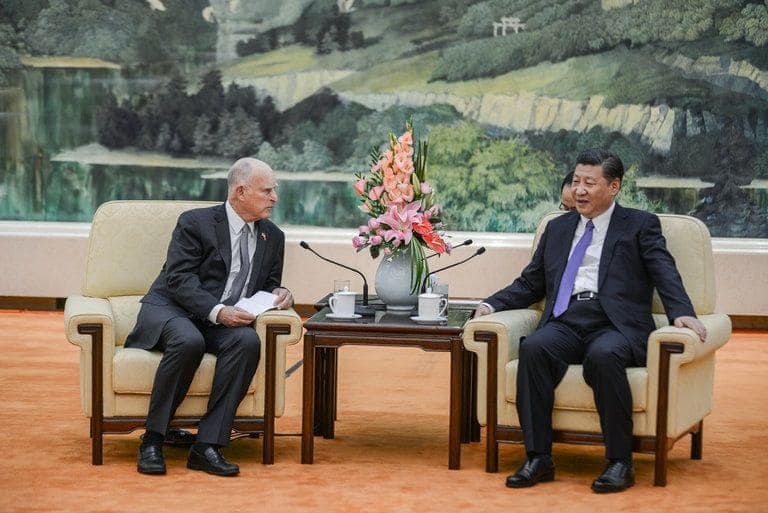Nathan Gardels is the editor-in-chief of Noema Magazine.
Nathan Gardels is editor in chief of The WorldPost, a partnership of the Berggruen Institute and The Washington Post.
Without doubt, Jerry Brown has been one of California’s most legendary governors. Yet his greatest role may still be ahead. His formidable political experience combined with his enduring commitment to resolving the existential challenge of climate change will position him as a global elder statesman when he leaves office next year.
As governor, Brown has put together a worldwide “network of the willing” to battle global warming in the wake of the U.S. withdrawal from the Paris climate agreement under President Trump, linking up 188 sub-national entities, such as municipal and provincial governments, in 39 countries and across six continents to push ahead with the accord.
Last June, Chinese President Xi Jinping broke long-standing protocol by meeting one-on-one with Brown, a sitting governor and not a national head of state, to discuss how to cooperate on climate change. This week, Brown is hosting the Global Climate Action Summit in San Francisco with participants from around the world, including Xie Zhenhua, China’s negotiator for the Paris accord, and Christiana Figueres, who chaired the Paris conclave and brought it to a successful conclusion.
Brown’s most important proposal going forward is to integrate California’s cap-and-trade program with Europe’s and China’s, which is based on the California model. That model caps greenhouse gas emissions and penalizes polluters with stiff fees, the proceeds of which are invested in projects that will help California reach its goal of total reliance on renewable energy sources by 2045. Polluters can buy and trade emissions allowances that are costly, thus incentivizing reductions. The goal is a “large worldwide carbon trading system,” the governor told European Union officials on a visit to Brussels last November.
California already collaborates with two Canadian provinces, Quebec and Ontario, on a range of policies, including carbon pricing through the cap-and-trade program. Extending that to the European Union and China would structurally bind decarbonization efforts in the state with two of the world’s largest economies.
The model for Brown’s elder statesman role is Jean Monnet, a former French official and diplomat who devised the idea of the European Coal and Steel Community implemented in the 1950s. The driving notion was that regional integration of heavy industry in the Ruhr Valley along the French-German border in the years following World War II would accelerate economic reconstruction and make war “not only unthinkable but materially impossible.”
Similarly, the integration of cap-and-trade markets today would not only ultimately establish a global carbon price that would diminish reliance on fossil fuels; it would also create a bridge of common intent across boundaries to save the planet despite national conflicts arising today in trade and security matters. Tying our climate fates together would in effect serve as a kind of preemptive version of the Coal and Steel Community.
Homogenizing emission standards and measures so they are comparable and compatible is, to be sure, a technically challenging task. But if the political will is there, it is certainly no less doable than the regional integration of coal and steel markets among rivals who had only recently concluded a devastating war. And it would lay the essential groundwork for renewed cooperation when the United States inevitably rejoins the Paris accord in the post-Trump era.
Brown has accumulated decades of experience in pushing ecological issues to the forefront and putting effective, concrete policies in place. He also has a long string of contacts globally and a deep pool of expertise to draw on.
While Brown’s ambitions for national office never panned out, a global role, for which he is wholly suited, now beckons. Becoming an elder statesman on climate change is the natural next step for a proven leader with lots left to offer.
This was produced by The WorldPost, a partnership of the Berggruen Institute and The Washington Post.





